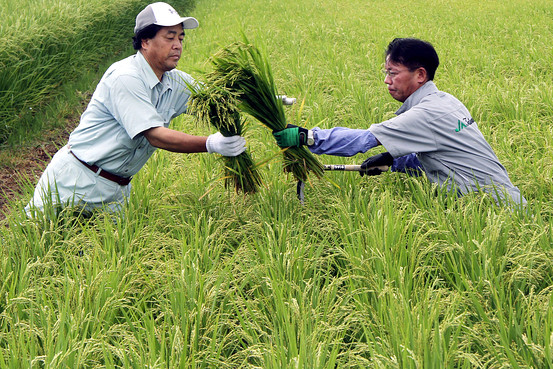Japan Finds Radiation in Rice

Fukushima Power Plant
EMF Protection Devices
Magnetic Field Detector
Friday, 19 August 2011 | By JURO OSAWA
TOKYO—A
Japanese regional government said Friday that it had
detected radioactive contamination in rice that was well
below hazardous levels, amid continuing worries in Japan
over food safety in the wake of the March 11 nuclear
disaster there.
Officials from the Chiba
prefectural government collect rice samples bound for
radiation tests at a field in Katori City on Aug. 4.
It was the first public report to date that radioactive
materials had affected rice. As this year's harvest season
begins, Japan's rice-growing regions are rushing to make
sure that what they ship out this autumn will be safe.
Public concerns have been mounting about this staple of the
Japanese diet, after a summer food scare sparked by
disclosures of the widespread sale of contaminated beef.
The tainted rice was found in Ibaraki prefecture, or
state, a southern neighbor to Fukushima prefecture, in a
city about 90 miles south of the stricken Fukushima Daiichi
power plant. The prefectural government posted a notice on
its website saying that it had detected 52 becquerels of
radioactive cesium from a kilogram of brown rice collected
Aug. 16 from the city of Hokota in the southern part of the
prefecture.
The detected level was about one-tenth of Japan's
regulatory limit of 500 becquerels per kilogram. No cesium
was detected from two other samples taken by the prefecture
that day from different locations.
"The level of cesium found in the rice is very low, so
this isn't problematic," said Takao Shimizu, a deputy chief
of the agriculture ministry's department that oversees
distribution of rice. He said that minor contamination is
possible because rice can absorb some radioactive elements
from the soil. The government prohibits any rice farming on
soil contaminated with more than 5,000 becquerels of
cesiumper kilogram.
Ibaraki is one of six prefectures in Japan that have
reported test results to the agriculture ministry, and more
prefectures will likely start testing their rice soon as
harvest time approaches. Some harvesting takes place in
August, though it mostly takes place in September and
October.
In prefectures where airborne radiation readings and soil
samples have shown relatively high levels of contamination,
the agriculture ministry is asking local officials to
conduct more thorough tests by dividing the areas into many
small districts.
Also on Friday, the government lifted its ban on the
shipment of beef from Miyagi prefecture—imposed July 28
—just north of Fukushima. Miyagi is one of four prefectures
where all beef shipments had been halted following the
reports of the spread of tainted meat.
The decision to lift the ban was based on a judgment that
Miyagi now has an effective system in place to monitor its
cattle and prevent any contaminated meat from reaching the
market, according to the agriculture ministry. Under the new
system, Miyagi will test the meat from every animal from 598
farms—about 11% of the prefecture's 5,396 cattle farms—that
had fed its cattle contaminated straw.
As for the cattle from the other farms, the prefecture
will test at least one animal from each farm every few
months.
Fukushima prefecture, where the government banned beef
exports, plans to test every cattle from the danger zone
roughly within 18 miles from the nuclear plant, and also
from any other farms outside the zone that have fed their
cattle contaminated straw. For the rest of the cattle farms,
the prefecture plans to test at least one animal from each
farm upon shipment.
Still, the government on Friday decided to defer lifting
its ban on beef shipments from Fukushima, after discovering
a new case of beef contaminated above the limit earlier in
the day. Because the reason for contamination wasn't
immediately clear, officials will first investigate the case
to see if it was also caused by contaminated straw, the
agriculture ministry said.
http://www.emfnews.org/store
|